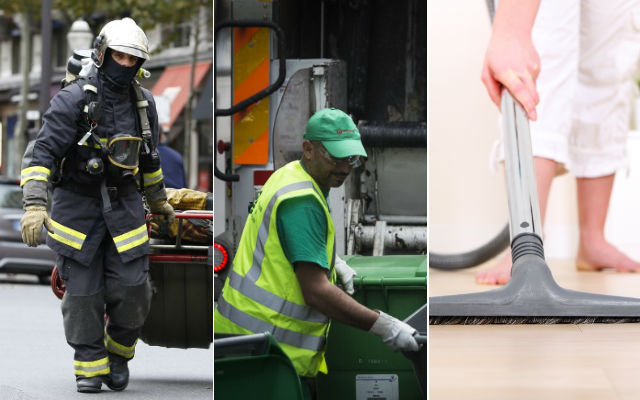The French might be said to be among the stingiest tippers in the world but that reputation does not take into account a longstanding New Year’s custom that still exists, although is said to be slowly dying out.
A week after Christmas, present-giving in France is far from over. After digging deep into their pockets to spoil their families, in early January it’s time to thank the “man/woman on the street” or in their apartment block, or even in their home.
It’s long been a tradition in France to give workers like postal workers, firefighters, rubbish collectors, cleaners, caretakers and concierges (les gardiens in your apartment block) an envelope with anything from €5 to €50 as a token of your gratitude.
These little financial shows of gratitude are called “étrennes“.
Etrennes can also take the form of a Christmas box or a New Year’s gift.
France has the Romans to thank for this selfless act. They worshipped Strenua, the goddess of the New Year, purity and well-being, and as a result they exchanged gifts as good omens.
The tradition has lived on in France despite being banned after the French Revolution.
While the tradition remains, some suggest the custom appears to be dying out somewhat with one poll showing that only 18 percent of French people will hand over cash this year.
For the president of the country’s union of concierges the tradition is dying out partly because people feel they have less cash to spare.
“Most people, whether or not they are owners or tenants, when you hear them speak, they talk of the problems that they have, the cost of the concierge or the expensive charges (extra-costs for the upkeep of the apartment block), so we understand,” said Slavica Nikolic.
The union president said that if the tradition of les étrennes disappears it will put the livelihoods of many gardiens at risk.
But the burning question asked in France each year is combien? In other words: how much should I give?
It’s important to remember that you are under no obligation to give anyone a tip and there’s no official rules to follow for how much to give.
The biggest dilemma normally surrounds the concierge of your apartment block. Residents must ask themselves how much they want to give the person who is in charge of receiving all their packages throughout the year, keeping their corridors clean and who sometimes they must leave a spare key with. Even if they are not a fan or find their gardien highly unhelpful, do they really want to cheese them off?
Here’s a guide on roughly how much you should give.
The concierge/gardien: If your building’s caretaker has been particularly helpful and polite, anything from €30 to €50. Although residents who have been there a few years may well give more, especially if the gardien has also been there a while.
There is an unwritten rule that renters should give 10 percent of their monthly rent, so €100 for anyone who pays €1,000 a month rent.
But it’s worth noting that giving the “étrennes” is not obligatory so if you really can’t stand your concierge, if you never see him, or if your block of flats is a mess, then don’t feel you have to part with a penny.
The postie: Postal workers should get between €5 and €8, France TV Info argues, especially if they come round to yours armed with a rival calendar to that of the firefighters.
The cleaner: At least €50. Remember the times your flat was a tip and how the cleaner left it looking sparkling before you hosted all those guests. That and the fact that they are likely underpaid, anyway.
The garbage collectors: A €5 bill for France’s rubbish collectors. They’re doing the job none of us want to do, they get up at an ungodly hour and they rake it in, literally but not metaphorically.
Firefighters: €5 to €10 for the sapeurs-pompiers. Some 78 percent of France’s 244,900 firefighters are volunteers so they’ve definitely earned more than just a pat on the back. Many firefighters also sell calendars at this time of year, but the money from these usually goes to firefighter charities or benevolent funds, rather than directly in the pompier’s pocket.
If however, you prefer the raunchy firefighter calendars then we have something for you too. Happy New Year.



 Please whitelist us to continue reading.
Please whitelist us to continue reading.
The dustbin men came twice ( Veolia *and* Ville de Paris) at the end of November. I’ve moved into a new apartment this year and was caught on the hop with no cash both times. They were not happy men.
Should I expect more people in January? Thanks for the tips on how much to give.